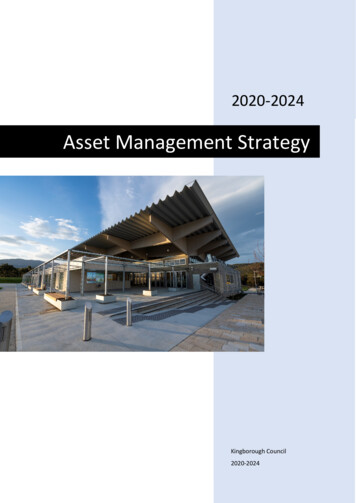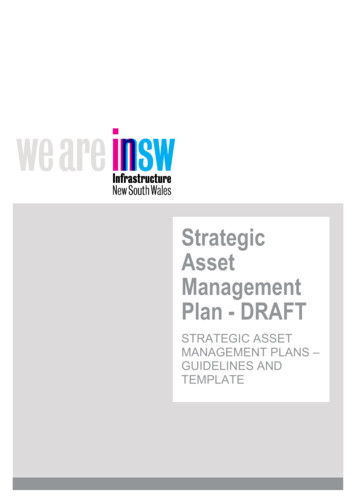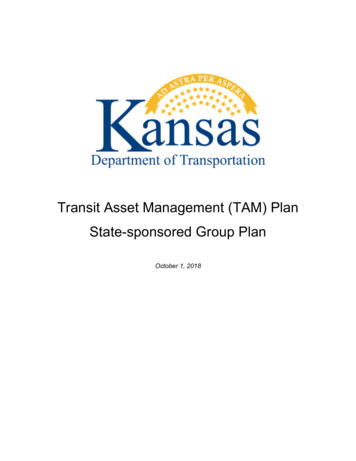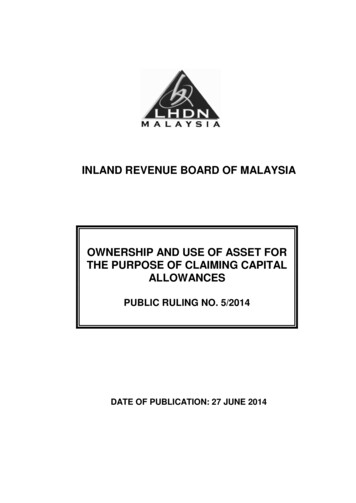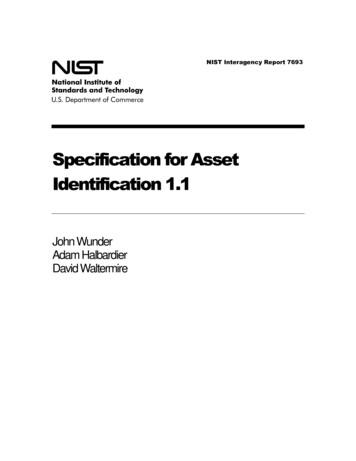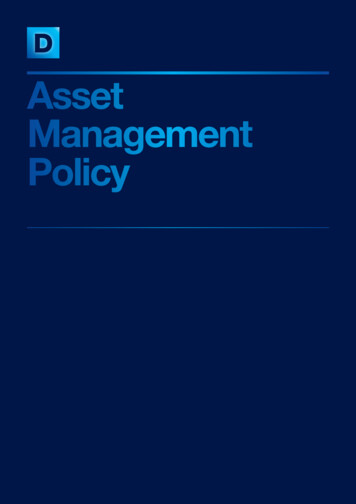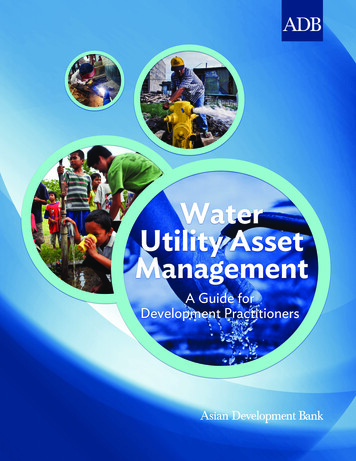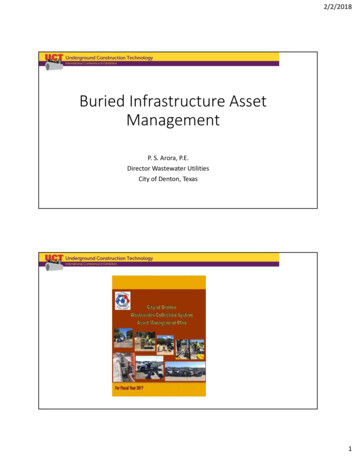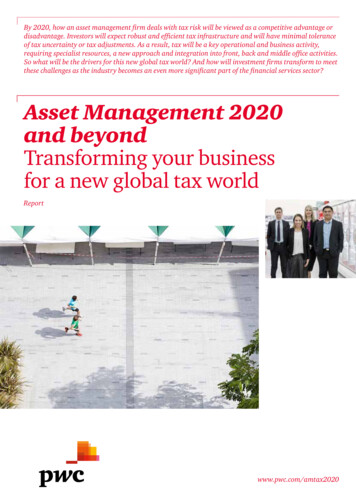
Transcription
By 2020, how an asset management firm deals with tax risk will be viewed as a competitive advantage ordisadvantage. Investors will expect robust and efficient tax infrastructure and will have minimal toleranceof tax uncertainty or tax adjustments. As a result, tax will be a key operational and business activity,requiring specialist resources, a new approach and integration into front, back and middle office activities.So what will be the drivers for this new global tax world? And how will investment firms transform to meetthese challenges as the industry becomes an even more significant part of the financial services sector?Asset Management 2020and beyondTransforming your businessfor a new global tax worldReportwww.pwc.com/amtax2020
2 PwC Asset Management 2020 and beyond
3 PwC Asset Management 2020 and beyondContentsIntroduction4Executive summary8The tax game changers12The tax function in 2020 and beyond26Contacts30
4 PwC Asset Management 2020 and beyondIntroductionBy 2020, how an asset management firm deals with tax riskwill be viewed as a competitive advantage or disadvantage.Investors will expect robust and efficient tax infrastructureand will have minimal tolerance of tax uncertainty or taxadjustments. As a result, tax will be a key operational andbusiness activity, requiring specialist resources, a newapproach and integration into front, back and middle officeactivities. So what will be the drivers for this new global taxworld? And how will investment firms transform to meet thesechallenges as the industry becomes an even more significantpart of the financial services sector?
5 PwC Asset Management 2020 and beyondFigure 1: Global Assets under management (AuM) to reach above USD100trn by 2020 Compound Annual Growth Rate (CAGR) GrowthAuM in USD 30.320072012201316.1020042020n Mutual funds n Mandates n Alternative investmentsSource: PwC analysisNote: We have revised our estimates for Alternative investments in 2020 upwards to USD13.6trn givenstrong market performance in 2013 and H1 2014.Tax should not be consideredsolely as a risk to manage – it isalso an opportunity.1 N one of the information or facts about the fictional investmentfirm, Investar Asset Management, are sourced from PwCclients or PwC client engagements. The examples have beendeveloped solely to illustrate key points in this paper.While the asset managementindustry will grow rapidly in thecoming years (see Figure 1), growthfor individual asset managementfirms will not be automatic. Therisks will change, as the tax andregulatory environments continue todevelop. Tax, in particular, will be akey operational and business activity,requiring specialist resources, anew approach, and integration intofront and middle office activities –including data reporting, productdevelopment, distribution and brandstrategy. Tax and reputation willbe inseparable concepts. Taxes willnow be viewed as an operationalrisk, joining the ranks of other keyrisks which senior managementtakes a keen interest in, and one thatneeds a strategically planned riskmanagement programme integratedinto all aspects of their businessoperations. How a firm deals with taxrisk will be viewed as a competitiveadvantage or disadvantage.In 2020, investors’ expectations willinclude a robust and efficient taxinfrastructure. And zero tolerance oftax uncertainty or tax adjustments.In addition, as many countriesstruggle with deficit reduction andthe need to invest, the whole of thefinancial services industry, includingasset management, will be expectedto play its part in policing the globalfinancial system and ensuring thattax authorities have the correct taxinformation on taxpayers.Total transparency of investorresidency and identity will be thenorm. Asset managers will have todemonstrate the highest standardsof anti-money laundering (AML)and know-your-customer (KYC)responsibilities, plus reporting totax authorities and to taxpayers onthe returns flowing from their funds.Politicians, regulators, the media andthe public will all expect nothing less.However, tax should not beconsidered solely as a risk to manage– it is also an opportunity. Managingtax risks and leakages well at all levels(investments, funds and investors)can distinguish asset managersfrom their peers. While managershave traditionally been tasked withgenerating performance ‘alpha’ fortheir investors, ‘service alpha’ in2020 will be a key differentiator.The concept of service alpha impliesan entirely new challenge for assetmanagers: how to communicate withinvestors about tax matters. Servicealpha will require the asset managerto first explain it and then helpinvestors recognise its benefits.To help asset managers plan for thefuture, in the last section of thispaper PwC has set out a vision ofwhat the tax landscape should looklike in 2020 to adequately addressthe new tax environment.The issues addressed by the CEOof our fictional firm, InvestarAsset Management1 (on page 6and throughout our paper) givean indication of the challengesthe industry faces in putting themanagement of tax risk at the heartof all strategic business change.
6 PwC Asset Management 2020 and beyondSunday22MARCHFrom: Angus Moreland, CEO, Investar Asset ManagementTo: All department headsCC: Charlene Ho, Head of Tax, Investar Asset ManagementDate: Sunday 22 March 2020 15.00Subject: Preparing for the week aheadDear all.Apologies for emailing on a Sunday night, but we’ve got a big weekahead. As we strive to be a cutting-edge global asset managementbusiness, we are moving forward with a raft of new products, newdistribution opportunities, changes in performance reporting and anoverhaul of our global technology platform. Each of these developmentshas tax implications, so please run all initiatives past Charlene beforeyou action them.Events during the past week illustrate perfectly why this is critical.Two new product offerings to pension funds were launched after almosta year of intensive work with great success. Increased certainty on thefunds’ withholding and capital gains tax risks and leakage has attractedmuch interest and commitments. Great stuff!Unfortunately, Charlene had to spend a significant amount of timeto get one of our fund directors out of serious trouble with some taxadministrations in Asia. Tax compliance for your products is not only amatter for the specialists at headquarters; the situation in Asia illustratesthat you can run into tax trouble personally if your products fail tocomply with local tax rules.I would also like to emphasise that the use of the Travel Tracker systemis an obligation for everyone – uncoordinated and uncontrolled travellingaround the world can put you and our company at risk.If we all work together, we can capitalise on this new tax environment,and use our superior infrastructure as a competitive advantage.RegardsAngus.
7 PwC Asset Management 2020 and beyondBy 2020 tax andreputation willbe inseparableconcepts. Taxeswill be viewed asan operationalrisk, joining theranks of other keyrisks which seniormanagement takesa keen interest in,and one that needsa strategicallyplanned riskmanagementprogrammeintegrated intoall aspects oftheir businessoperations.
8 PwC Asset Management 2020 and beyondExecutive summaryAsset managersadapt to new role atcentre stageAs banks and insurers retreat from many investment businesslines, asset managers will be more influential across a rangeof products by 2020. A new breed of global mega-managerswill attract huge focus from tax authorities, which will havespecialist teams with the capabilities to carry out much moredetailed enquiries than in the past and the powers to requestreal-time investor-related information. Asset managers willrespond by dispersing their strategic tax resources throughouttheir business operations to give front, middle and back officestaff access to real-time expertise. The in-house tax team willhave developed to deal with perpetual audits and to engagewith tax authorities on a frequent basis to influence policy andhelp guide the implementation of tax rules.Transparency: firms leave no stoneunturnedTax transparency will be a fact of life in financial markets by 2020 as theCommon Reporting Standard (CRS) and global tax reporting becomereality. Post the examination by the Organisation for Economic Cooperation and Development (OECD) of the basis of taxation for a permanentestablishment, many tax authorities will focus on the economic nexusof an asset management contract and the ultimate investor, rather thanjust the physical nexus of the asset manager, its property, and its staff, indetermining the location of taxation of the asset manager’s business.Through political pressure, investor demand and regulatory change, manyoffshore financial centre products will have moved onshore into a range ofnew registered products as jurisdictions and regional blocks will continueto compete to offer attractive investment vehicles for cross-border anddomestic investment. Many of these onshore vehicles will themselves betax exempt, obtain double tax treaty access and suffer no withholding tax ondistributions or redemptions as countries will continue to compete to attractvital inward investment. New specialist platform investment products likesecuritisation regimes and real estate investment trust (REIT) funds will becreated as part of this competitive landscape. All of which will bring newcomplexity to product design and fund structuring.
9 PwC Asset Management 2020 and beyondPortfolio taxationwill become a keybattlegroundBy the early 2020s, the OECDBase Erosion and Profit Shifting(BEPS) action on hybridinstruments, interest deductibilityand treaty access will have ledto an environment where somedegree of tax leakage is a fact oflife for many funds. Performanceevaluation and attribution will focuspredominantly on post-tax yields.Prospective investors will ask abouttax disclosures even taking theirindividual tax charge into accountbefore they consider investing ina fund. They will be seeking morecertainty with respect to tax issues.With more transaction taxes, localwithholding and self-assessmentcapital gains regimes, every assetpurchase and sale will have to becarefully examined from a tax riskand reporting perspective, requiringasset managers to have real-timeaccess to data on global tax regimes.When launching new products, assetmanagers will routinely carry outfull assessments to make productscompetitive in all channels. Investorswill gravitate towards managers thatoffer products reflecting investorspecific tax profiles. By 2020, anumber of integrated businessescombining asset management,wealth management and privatebanking activities will be able toprovide a full tax advisory service toclients.Tax branding willbe at the heart ofmarketing andreputationBy 2020 and beyond, tax will bejust another operational businessrisk in the same way that valuationand regulatory reporting came to beviewed as operational business risksyears before. Control reports overoutsourced services by custodians,administrators and transfer agentswill routinely include tax riskmanagement and governance asa core control objective. As assetmanagers’ portfolios become larger,internal audits of the tax functionwill be carried out to evidencetheir own standard of tax riskmanagement.Asset managers and their clients,keen to avoid being taintedby association with inefficientand potentially inaccurate taxcompliance, will have becomehighly proactive on the issue.Asset management PR efforts inthe 2020s will focus not just onfund performance, but on taxand compliance, with detailedstatements released into thepublic domain on tax policies,remuneration and rewardstructures, the amount of tax paidand where it is paid.Tax technologywill be key toperformance andclient satisfactionBy 2020 and beyond, theoverwhelming trend will be to movethe tax process to a technologyenabled environment thatconnects existing technologies totax-sensitised databases that areconnected via a centralised tax datahub. Technology for tax will enableinvestment firms to make timely taxinformed investment decisions andprovide investors and tax authoritieswith the transparency and reportingthat they demand. It will also enabletax uncertainty minimisation.Technology will also create theability to differentiate betweenthe alpha created by the portfoliomanager and the alpha created(indirectly) by the capability of thetax team to manage tax leakage andtax risk.Funds that demonstrate taxefficiency at the fund level relativeto their peers will create a distinctadvantage when fundraising in ahighly competitive environment.Technology tools will also enableworkflow management, allowingfund managers to monitor tax
10 PwC Asset Management 2020 and beyondTax authorities will requestwhatever information theywant from asset managersthrough having direct accessto their IT systems rather thanasset managers pushing datato them.services internally and at theirservice providers in real time.Technology will not only be closeto the heart of asset managers –the tax authorities will have madesignificant investments by 2020 too.As a result, the age of selected paperbased reporting by asset managersto the tax authorities will be over –perhaps even annual reporting willbe over. Tax authorities will requestwhatever information they wantfrom asset managers through havingdirect access to their IT systemsrather than asset managers pushingdata to them.The tax functionof the futureAs a result of these considerablechanges to the tax environment, thetax function in 2020 and beyond willbe significantly different from whatwe know today. The tax functionwill play a key role in the day-today management of operationalrisks and will no longer only delivercompliance and make tax technicalassessments. The assessment ofcomplex data and its implication inbusiness and product developmentdecisions will be the new normal.Consequently, the profile andcomposition of the tax function willhave changed. It will be critical forasset managers to decide to whatextent they want to rely on internalsources. The increased complexityof the tax function will require thatit spends significant periods of timewith operational activities in orderto be able to act as a trusted adviserinternally and to key executives.Asset managers will need to ensurethat highly skilled tax peopleare brought into the heart of thebusiness. The tone needs to be set atthe top. The tax function is criticalto the entire operation and seniormanagement will need to makesure that this is well understoodthroughout the ranks.
11 PwC Asset Management 2020 and beyond
12 PwC Asset Management 2020 and beyondThe tax gamechangersThe landscape for asset managers in the coming years is setfor radical change. This change was set out in a paper PwCpublished in early 2014 – Asset Management 2020:A Brave New World2 – which predicted the global trendsimpacting the industry in the coming years and identified theirconsequences. These trends included a huge rise in assets andfundamental changes in the investor base, while cost pressuresrose. Significantly for the tax function, there would be astep-change increase in transparency, changing the perceptionof tax and making it a key operational issue.So what do these predicted shifts mean for the evolution of tax processesthat will allow firms to survive and remain competitive in the years to 2020and beyond?To find out, let’s take a look at a week in the life of Investar AssetManagement. It’s Monday 16 March 2020 .2 Asset Management 2020: A Brave New World – PwC, 2014.
13 PwC Asset Management 2020 and beyondMondayAsset managers adapt to new role at centre stage16MARCHFrom: Charlene Ho, Head of Tax, Investar Asset ManagementTo: All department headsDate: Monday 16 March 2020 07:30Subject: Analysis of tax-related data – your help requiredDear all.Please ensure that you assist the embedded tax specialists in each ofyour teams in the analysis of all tax-related data by the end of the weekso that our 2019/2020 tax report is ready for audit at the end of nextmonth. Remember that any omissions or inaccuracies may result inconsiderable financial and/or criminal penalties and the company beingplaced on the tax authorities’ ‘non-compliant’ lists. In addition, investorsare looking for tax foot faults as they consider where to invest.I am particularly interested in seeing how we have managed the tax risksin our new Asian peer-to-peer lending platform.RegardsCharlene.By 2020, non-bank finance will nolonger be in the shadows. Underpressure from regulators and fromdemands on regulatory capital,banks and insurers will haveretreated to their core businesses.Asset managers will have becomeproviders of a far broader set ofproducts than in 2015. They will bedominant across a range of productsand activities, including: Pension and lifetime savingsproducts corporate financing, such asdirect lending, trade receivablesand invoice factoring distressed assets andcommodities peer to-peer lending and crowdfunding infrastructure funding money market strategies.As a result, by 2020 and beyondeconomies of scale will becomeparamount and a new breed ofmega-manager will have emerged,with a footprint in all geographiesand distribution channels. Someof these mega-managers willattract a great deal of focus frompolicymakers, regulators and taxauthorities.Equally, many new non-financeboutiques will have emerged asspecialists in the new non-bankfinance areas. The complexityof these strategies will attractattention from tax authorities asthey look to stay abreast of industrydevelopments.The growing size and importanceof the asset management industrymeans that tax authorities will beinterested in every aspect of theasset management industry andits participants. Specialist teamsat many tax authorities will havethe capabilities to carry out much
14 PwC Asset Management 2020 and beyondDealing with derivativesThe tax landscape relating to syntheticand derivative type transactions will getincreasingly complex as more of thesetransactions become centralised on regionalexchanges and tax authorities look to theunderlying substance of the synthetic todetermine the tax attributes of the yield.Uncertainty of treatment will create uncertaintax positions within some portfolios andfunds will have to be carefully managedand positions disclosed in fund accounts.International Financial Reporting Standards(IFRS) and US Generally Accepted AccountingPrinciples (GAAP) will have become aligned inthis respect.more detailed enquiries and assetmanagers will have to be able torespond. Access to records is notan issue: tax authorities will havedirect access to asset managers’ ITplatforms. This started with VAT(SAF-T)3 and quickly became aglobal standard. As yet, only someglobal businesses are subject toperpetual tax audits across the globeby their home tax authority, withcoordinated assistance from localtax authorities.In the future, all investmentactivity will be reported in someway by a counter-party, financialintermediary, fintech provider orbroker. Tax authorities will routinelyaccess such data from regulatorsand market operators and will beable to routinely test these newnon-bank finance investment areasfor compliance with transactiontaxes, withholding taxes and selfassessment capital gains taxes. Atpresent, tax rules in each countryhave not kept pace with newinvestment strategies and quirks,and anomalies have to be carefullynavigated to avoid tax traps.Zero-tolerance taxenvironmentSelf-assessment – already common in2015 – will have become the dominantmodel for global tax collection by 2020.3 S AF-T (Standard Audit File for Tax) is an OECD standard forthe electronic exchange of accounting data from organisationsto a national tax authority or external auditors. The standardis used by some European countries to file tax returnselectronically.Self-assessment – already commonin 2015 – will have become thedominant model for global taxcollection by 2020. This reflectsgrowing pressures on the taxauthorities themselves. Manyauthorities, unable to deal withincreased complexity and volumes,will have recalibrated their systemsto shift the burden of calculationand tax collection to funds andfund management firms. Some taxauthorities will download financialstatements directly from investmentfirms and create automatic taxcalculations.The calculation will be either right– or wrong. Fines and penaltiesfor wrong, late or missed selfassessments will be significantand by far exceed fines for wrongdeclarations as in 2015. Fines willrelate to both failure to comply andfailure to comply completely withinformation requests. It will notbe enough to pay the appropriateamount of tax – the supportinginformation and calculations willalso have to be presented in theappropriate formats.How will assetmanagers respond?The responses to far greater scrutinywill take place at a number of levelswithin asset management firms.First, the huge increase in thevolume of tax reporting willhave put cost pressures on assetmanagement tax team budgets.By 2020 many firms will be focusingon their tax costs and will be keento extract more from existingresources. This places an emphasison using technology to increaseefficiency, tighten complianceprocedures and avoid regulatorypenalties.Tax resource will have become moredispersed throughout the businessoperations of the asset manager togive front, middle and back officestaff access to embedded realtime expertise and respond to taxauthority demands.The in-house tax team will havedeveloped technology tools to dealwith complying with perpetualaudits and closer scrutiny in general.IT systems will deal with manyprocesses that were manual orsemi-automated in 2015, leavingstretched tax teams with more timeand resources to focus on highervalue activities.
15 PwC Asset Management 2020 and beyondTuesdayTransparency: firms leave no stoneunturned17MARCHFrom: Ayo Okonjo, Head of Private Equity,Investar Asset ManagementTo: Charlene Ho, Head of Tax, Investar AssetManagementDate: Tuesday 17 March 2020, 08:30Subject: Questions from Asian taxauthoritiesHi Charlene. A few Asian tax authorities haveasked why our Swiss private equity guysare spending so much time in Asia talkingto target companies. They are aware of ourpresence from immigration records and areasking whether we are there for informationonly or to do deals. How should we react?RegardsAyo.From: Charlene HoTo: Ayo OkonjoDate: Tuesday March 17 2020, 16:45Subject: Questions from Asian taxauthoritiesHi Ayo. It is essential to identify what yourguys are actually doing there. Too muchpresence can trigger a local tax presence orpermanent establishment. And, that couldmean that Investar (and perhaps our PEFunds) is already in breach of its tax filingobligations. Please ask your teams to checkall their entries in Travel Tracker and send methe records on who was where, when, howlong and for what purpose.RegardsCharlene.In the illiquid space, investors willcontinue to demand that investmentprofessionals invest meaningfullyin their own investment strategies.Remuneration, reward, carryand co-investment structures willcontinue to be ever more complex asinvestment teams are based in moreand more geographies with differingemployment, payroll, corporateand personal taxes. The public’sperception of the relatively highlevels of reward within the industrywill continue to attract the attentionof politicians, the media, regulatorsand tax authorities.Regulators in most jurisdictions willhave the technology, but not alwaysthe necessary authorisations, tomake demands for information –such as the submission of travel datafor key investment firm executives.To get ahead of the game and alignthemselves – where appropriate –with the aims of regulators, someasset managers will have decided todo this unilaterally. The exchangeof information between taxauthorities will be no longer limitedto groupings of jurisdictions knownin 2015 (e.g. the EU, G20, the US),countries will have formed clustersindependently from those groupingsto exchange a variety of tax-relatedinformation.Finally, education will be ableto mitigate policy mistakes. Taxauthorities will often not possessthe same breadth of perspectiveon the industry as participants,and will have come to recognisethat a collaborative approach tothe industry is more productivethan a strict, adversarial posture.Asset managers will, in some cases,be able to assist tax authorities byfrequent interaction to apprise themof new developments and complextax dynamics. The nature of fundmanagers’ business will afford thema global view, which may not beavailable to the local tax authority.Full transparency will be a fact oflife in financial markets by 2020 asglobal tax reporting becomes reality.Many tax authorities will attemptto collect what they see as rightfullytheirs by focusing on the economicvalue chain of the asset manager’sactivities rather than solely on thephysical nexus of employees ofthe asset manager. In 2015, withinthe US, economic nexus taxationhas grown from ten states4 to becommonplace by 2020 and beyond.As a concept of taxation it has alsocaught on globally. So, for instance,a Singapore-based asset managerservicing a US pension fund couldbe subject to double taxation – fromboth the local US state and theSingaporean tax authority. This isdespite the fact that the Singaporeanmanager does not have a physicalpresence in the US.In 2020 and beyond, investmentfirms will need timely access to alltheir accounts in every jurisdictionand be able to make comparisonsat group level. They must be able toreport this in every country in whichthey operate in order to provide asnapshot of profits, revenues, supplychains, organisation structure andcompensation. BEPS-driven countryby-country reporting and exchangeof information will be used by taxauthorities to put together a fullpicture of organisations and to sharethis information with each other.4 As of 1 September 2015.
16 PwC Asset Management 2020 and beyondIn an increasingly complexworld it may not be possible tooperate simple, global rewardand retention structures.Fly-in, fly-out days are overOne of the main impacts of the BEPS reformagenda is a lowering of the permanentestablishment threshold. The days of runninga main office in a single jurisdiction aresoon to be over. Operating on fly-in, fly-outin some jurisdictions won’t be acceptablein 2020. Following the work of the OECDon permanent establishment threshold in2014 and 2015, many countries treat fly-insas if they were permanently established inthe country. This means an increased levelof cross-border supplies triggering moretransfer pricing and VAT topics to deal with.In addition, compliance with local payrolland social security obligations adds to theglobal complexity of issues which the assetmanager’s HR and tax teams have to monitorand comply with. Individuals will also have tobe mindful of their own personal tax situationand their own tax residency status.As new cross-border distributionhubs have developed, such as theAsian passport regime, managerswill increasingly be required by localregulators to have real substanceand a local presence in each of theiroverseas territories. In order to beable to distribute widely, ‘bootson the ground’ will be required,including local distribution teams,local fund managers and local taxand regulatory experts. In addition,local regulators will often requireregulatory capital to be held locally,leading to cross-border fundingand interest deductibility issues forglobal asset managers.As asset managers will need torelocate key staff to lead and operatethese new local businesses, dealingwith global mobility issues will bekey. Having clear strategies for pay,benefits and allowances will be vitalas will frequent communicationbetween HR and the central taxfunction. Global reward andretention structures like carry, coinvestment and Long Term IncentivePlans will need to accommodatelocal tax requirements to avoiddouble taxation risks. As employeesbecome more mobile, these mayarise, for example, on the grantingand vesting of an equity awardif these events take place in twodifferent jurisdictions.In an increasingly complex worldit may not be possible to operatesimple, global reward and retentionstructures, leading to a widepatchwork of reward structuresacross global businesses and therebyheightening the risk of inadvertentmistakes and errors. Reliance onlocal outsourced payroll providerswill not be a defence when taxauthorities come knocking aboutlocal payroll audits.How will assetmanagers respond?The most tangible change will bewhere fund managers domiciletheir products and their employees.Investment firms will have revisitedhow they operate and haveestablished new guidelines for theirstaff. Many previously unregulatedproducts will have opted for the taxcertainty of regulated status.Tax efficiency in terms of productdevelopment, distribution andrewarding key talent will bethereby redefined. As mobileemployees move from jurisdictionto jurisdiction, the risk of doubleor even triple taxation will ariseon them individually or froman employer’s perspective asdifferent countries seek to taxreward features, such as deferredbonuses, carry or share-basedreward structures, under differentrules. Firms will have to decide,for example, whether employeesin local markets should share in aglobal bonus pool or whether theyshould structure rewards differentlydepending on the jurisdiction.Many firms will have decided that agreater level of engagement with taxauthorities is advantageous. Whilesome firms would be worried thatengagement would invite excessivescrutiny, others will have realisedthat the release of a large body ofinformation into the public domainrequires engagement in order tomanage it sensitively.Organisations will have becomemore PR savvy about the
6 PwC Asset Management 2020 and beyond From: Angus Moreland, CEO, Investar Asset Management To: All department heads CC: Charlene Ho, Head of Tax, Investar Asset Management Date: Sunday 22 March 2020 15.00 Subject: Preparing for the week ahead Dear all. Apologies for emailing on a Sunday night, but we've got a big week ahead. As we strive to be a cutting-edge global asset management
